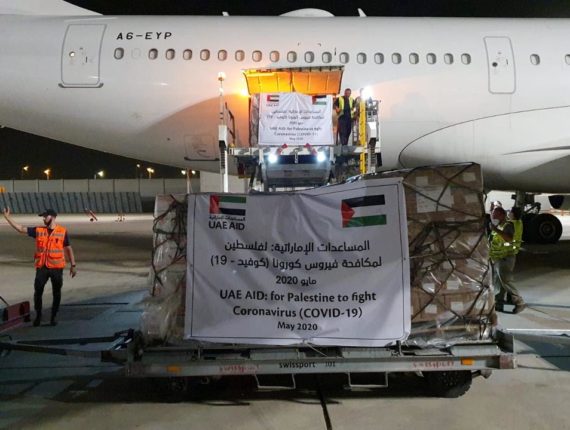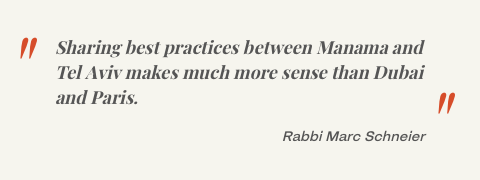
Arab News
By Rabbi Marc Schneier
June 19, 2020

A cargo plane operated by Etihad Airways offloads COVID-19 aid at Ben Gurion Airport in Lod, near Tel Aviv, Israel, May 19, 2020. (Reuters)
At the time of writing, there have been more than 715,000 confirmed cases of the coronavirus disease (COVID-19) in the Middle East, and experts predict that this number will continue to rise as governments lift the bans requiring people to stay at home. What is alarming government officials around the world is the predicted second wave of this pandemic, which will hit around the fall and winter months, leaving many to question whether they are prepared. Despite that, there is something to look forward to, as the Gulf and Israel have been working together to combat COVID-19. If they continue to do so, they can ensure the region finds a cure that benefits people around the world.
Since the eruption of COVID-19 in the Middle East and around the world, I have been involved in discussions between Israelis and Gulf leaders on strategies for fighting it — both in my official position as adviser to King Hamad bin Isa Al-Khalifa of Bahrain and my unofficial one as “Rabbi in the Gulf,” through which I have relationships with top governmental leaders in the UAE, Saudi Arabia, Bahrain, Qatar, Oman and Kuwait. I have repeatedly heard leaders in the Gulf express variations on the following statement: “Rabbi, with our resources and wealth and Israel’s brain trust and technological prowess and innovation, we can create a vaccine and a cure.”
COVID-19 brings the region together because all Middle Eastern countries share a common climate and, in many cases, common cultures. Sharing best practices between Manama and Tel Aviv makes much more sense than Dubai and Paris. For example, the climate allows Middle Easterners to enjoy outdoor activities much of the year. However, the heat of the summer will typically draw Middle Easterners inside, posing different COVID-19 challenges, which are common to the region but not necessarily to others. From a cultural perspective, when you sit for a large meal in the Middle East, a series of small salads and hummus will be brought to the table and shared. That is not as prevalent in other parts of the world. These are just a few examples of the commonalities Israel and its Gulf neighbors face when combating COVID-19 and why it makes sense for them to work together.
The Gulf states, which have been drawing closer to Israel for years, in part because of a common existential threat from Iran, now have another powerful incentive to work constructively with the state of Israel. They are deeply concerned about the disruptive impact of COVID-19 on their own societies, including the economic damage they have incurred due to the crash in the global price of oil. Given the high stakes, these countries are increasingly looking to Israel to help them find solutions. There is clearly an opportunity for Israel to join forces with them in a situation where matters of public health transcend political differences.
While the UAE, like the other Gulf states, does not have formal diplomatic relations with Israel, its national airline, Etihad, has in recent weeks landed the first two flights in its history at Ben-Gurion Airport. They were filled with ventilators and other medical equipment to help the Palestinians cope with the COVID-19 crisis. The aid will be distributed by the UN.
Meanwhile, UAE Ambassador to the UN Lana Zaki Nusseibeh told an Israeli journalist in May that her government would be willing to work with Israel on a vaccine. During a webinar, Nusseibeh remarked: “One of the things I would say about our perspective in science and tackling this pandemic is that it shouldn’t know any borders or boundaries.” She went on to affirm that her country has “had Israeli medics participate in previous events in the UAE,” adding: “I’m sure there’s a lot of scope for collaboration.” She then congratulated Israeli doctors on reported advances in research on COVID-19 treatments, remarking: “That is very exciting for all of our part of the world — we are also working on that too, so there is potentially room for cooperation there.”

Following the second Etihad plane landing with aid supplies in Israel, Hend Al-Otaiba, director of strategic communications at the UAE Ministry of Foreign Affairs, tweeted: “This virus demands collective action on an unprecedented scale — we cannot allow politics to undermine global health security at such a critical moment. The UAE will do whatever it can to help and is grateful for the support it has received from others, including the UN.”
Israel and the Gulf states continue to battle against COVID-19 while they plan for the second wave. Smartly, they are doing so by working together. I believe that Israel-Gulf cooperation — on COVID-19 and other matters — is a win-win not only for Israel and the Gulf, but for the Palestinians too. Despite the ongoing diplomatic deadlock between Israel and the Palestinian Authority, the two governments have been successfully cooperating in fighting COVID-19, which threatens them both. And the solid connection both sides enjoy with the Gulf states is a central element in strengthening that connection.
Rabbi Marc Schneier is President of the Foundation for Ethnic Understanding and a noted adviser to many Gulf states.
Copyright © 2025 Foundation For Ethnic Understanding. All rights reserved. | Privacy Policy